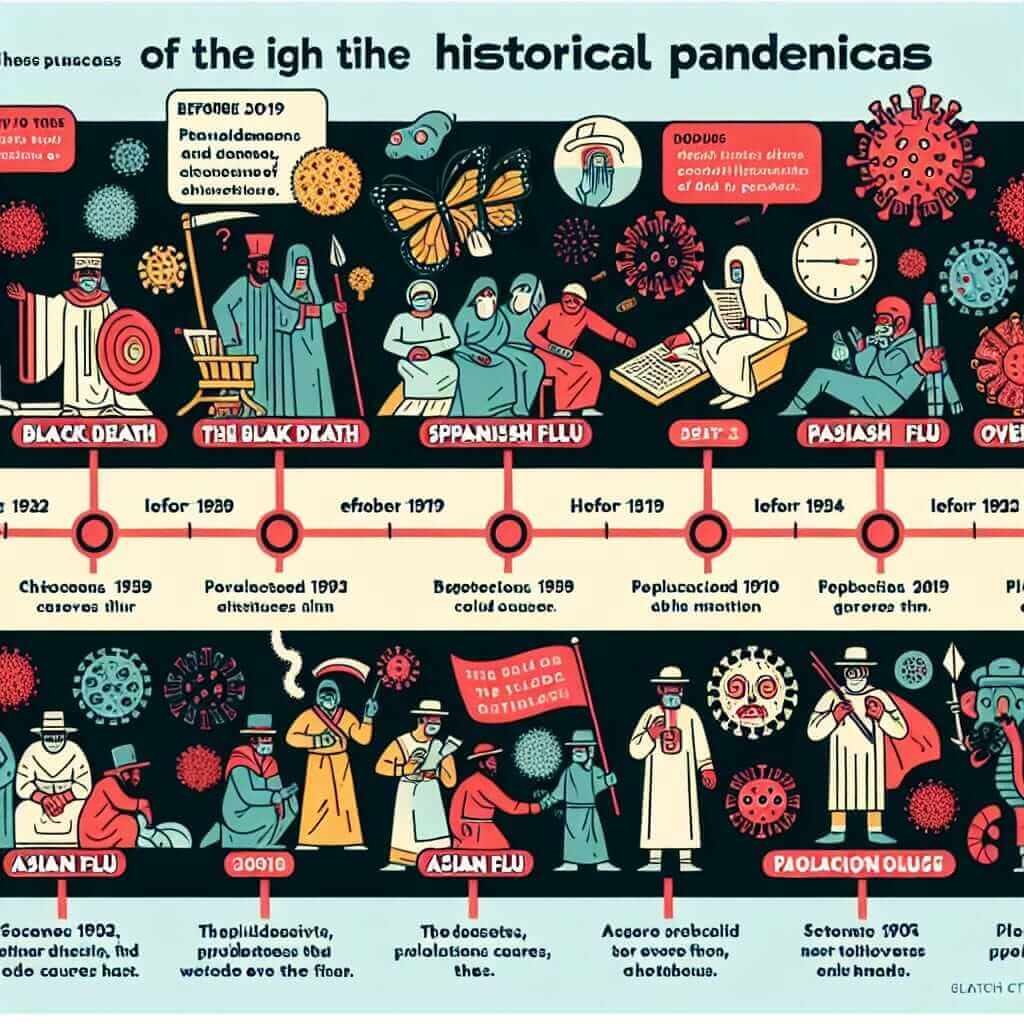In the IELTS Reading test, candidates face a variety of topics that span across different domains, including science, history, and contemporary issues. One frequently appearing theme, given its relevance and rich historical context, is the analysis of global pandemics. Historically, pandemics have had transformative effects on societies, making it an essential topic for IELTS aspirants to be well-versed in. This article aims to provide an in-depth reading practice exercise focusing on the “Historical analysis of global pandemics,” offering detailed insights, questions, and explanations to enhance your preparation.
Nội dung bài viết
The Reading Passage: “Historical Analysis of Global Pandemics”
Note: The following text is categorized as “Medium Text.”
Historical Analysis of Global Pandemics
Pandemics have plagued human societies since ancient times, causing profound social, economic, and political upheavals. These widespread outbreaks of infectious diseases transcend borders and have had significant impacts on global populations. This passage examines some of the most influential pandemics in history and their long-lasting effects on the world.
One of the earliest recorded pandemics was the Plague of Athens which occurred in 430 BC during the second year of the Peloponnesian War. It decimated the Athenian population and critically weakened the city’s status as a major power. Another notable early pandemic was the Antonine Plague, which ravaged the Roman Empire from 165 to 180 AD, killing an estimated five million people. These pandemics not only reduced populations but also altered the course of history by weakening states and shaping turning points in wars and empires’ declines.
The most infamous pandemic in recorded history is the Black Death, which struck Europe, Asia, and North Africa between 1347 and 1351. This pandemic halved the population of Europe, resulting in profound economic consequences: labor shortages led to social unrest and the eventual collapse of the feudal system. The origin of the Black Death, caused by the bacterium Yersinia pestis, has been traced to Central Asia, from where it spread along trade routes.
Moving into the 20th century, the 1918 influenza pandemic (often referred to as the Spanish flu) stands out due to its staggering death toll, estimated at 50 million worldwide. This pandemic was exacerbated by the movement of troops returning from World War I, facilitating the rapid spread of the disease. The Spanish flu led to advancements in public health policies, including the establishment of more comprehensive systems for disease surveillance and intervention.
In more recent times, the HIV/AIDS pandemic, which emerged in the late 20th century, continues to affect millions globally. Unlike other pandemics that had a more abrupt and short-term impact, HIV/AIDS has resulted in sustained social and economic challenges over decades. Efforts to combat HIV/AIDS have led to significant biomedical advancements and greater global cooperation in disease control.
These historical analyses of global pandemics illustrate the persistent threat of infectious diseases and highlight the importance of preparedness. Each pandemic has contributed to shaping societal structures, pointing to the need for robust public health systems and international collaboration to mitigate the impacts of future pandemics.
Questions and Answers
Questions
-
Multiple Choice: What was one of the long-term economic consequences of the Black Death?
- A) The unification of European kingdoms
- B) The decline of the feudal system
- C) The rise of the Roman Empire
- D) The reduction in trade routes to Central Asia
-
True/False/Not Given: The Antonine Plague led to the complete collapse of the Roman Empire.
-
Matching Information: Match the pandemics to their significant impacts:
- Plague of Athens
- Antonine Plague
- Spanish Flu
- HIV/AIDS
-
Summary Completion: Complete the summary using words from the text:
“The pandemic known as the __ in 1347-1351 greatly affected Europe, leading to shortages and the fall of the ____ system.”
Answers
- B) The decline of the feudal system
- False
-
- Plague of Athens: Critically weakened the city’s status
- Antonine Plague: Killed an estimated five million people
- Spanish Flu: Led to advancements in public health policies
- HIV/AIDS: Resulted in sustained social and economic challenges
- “Black Death”, “labor”, “feudal”
Common Errors and Lessons
- Misinterpreting Dates and Events: Ensure careful reading to avoid mixing up pandemics and their impacts.
- Vocabulary Traps: Be cautious of synonyms or related terms that might trick you into incorrect answers.
Vocabulary
- Decimate (v) [dɛsəˌmeɪt]: To destroy a large number of.
- Feudal (adj) [fjuːdə(l)]: Relating to the medieval European political system.
- Intervention (n) [ɪntəvɛnʃən]: The act of becoming involved in something to influence the outcome.
Grammar Focus
- Past Simple vs. Present Perfect: Use past simple for completed actions in the past (e.g., “occurred in 430 BC”), and present perfect for actions that have relevance to the present (e.g., “has contributed to shaping”).
Tips for High IELTS Reading Scores
- Practice Regularly: Regular reading practice with diverse topics increases familiarity with the format.
- Time Management: Develop a strategy to divide your time effectively across the passages.
- Deep Analysis: Breakdown passages into sections to grasp the main ideas and details.
For more reading exercises, you might be interested in our articles on The Influence of Mass Media on Public Opinion and The Impact of Public Health Policies on Society.

Ensure you are well-prepared by continually practising and learning from each reading exercise. Good luck!